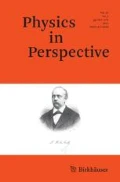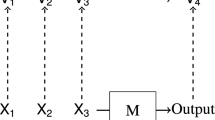Social constructionists believe that experimental evidence plays a minimal role in the production of scientific knowledge, while rationalists such as myself believe that experimental evidence is crucial in it. As one historical example in support of the rationalist position, I trace in some detail the theoretical and experimental research that led to our understanding of beta decay, from Enrico Fermi’s pioneering theory of 1934 to George Sudarshan and Robert Marshak’s and Richard Feynman and Murray Gell-Mann’s suggestion in 1957 and 1958, respectively, of the V–A theory of weak interactions. This is not a history of an unbroken string of successes, but one that includes incorrect experimental results, incorrect experiment-theory comparisons, and faulty theoretical analyses. Nevertheless, we shall see that the constraints that Nature imposed made the V–A theory an almost inevitable outcome of this theoretical and experimental research.
Similar content being viewed by others
Author information
Authors and Affiliations
Corresponding author
Additional information
Allan Franklin: Allan Franklin is Professor of Physics at the University of Colorado. He works on the history and philosophy of physics, particularly on the roles of experiment.
Rights and permissions
About this article
Cite this article
Franklin, A. Are the Laws of Physics Inevitable?. Phys. perspect. 10, 182–211 (2008). https://doi.org/10.1007/s00016-006-0309-z
Published:
Issue Date:
DOI: https://doi.org/10.1007/s00016-006-0309-z
Keywords:
- Enrico Fermi
- Richard P. Feynman
- Markus Fierz
- Murray Gell-Mann
- Emil J.Konopinski
- Tsung-Dao Lee
- Robert E. Marshak
- Louis Michel
- Wolfgang Pauli
- E.C. George Sudarshan
- George E. Uhlenbeck
- Chien-Shiung Wu
- Chen Ning Yang
- Hideki Yukawa
- beta decay
- radioactivity
- neutrinos
- pions
- muons
- nuclear physics
- particle physics
- Sargent curves
- Konopinski-Uhlenbeck theory
- Gamow-Teller selection rules
- angular-correlation experiments
- nonconservation of parity
- V–A theory of weak interactions
- Universal Fermi Interaction
- philosophy of physics
- philosophy of experiment




